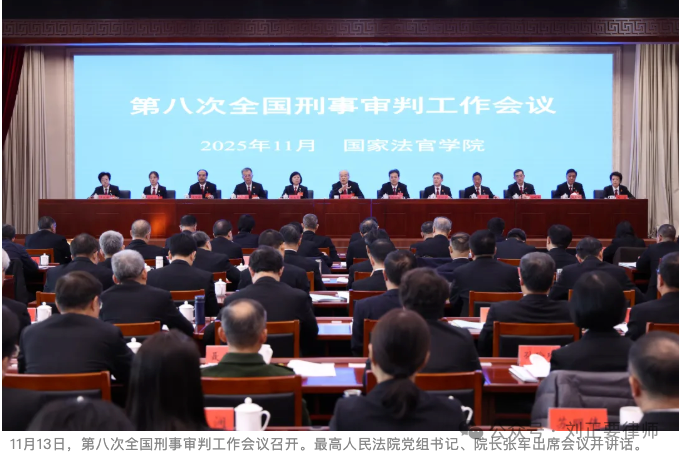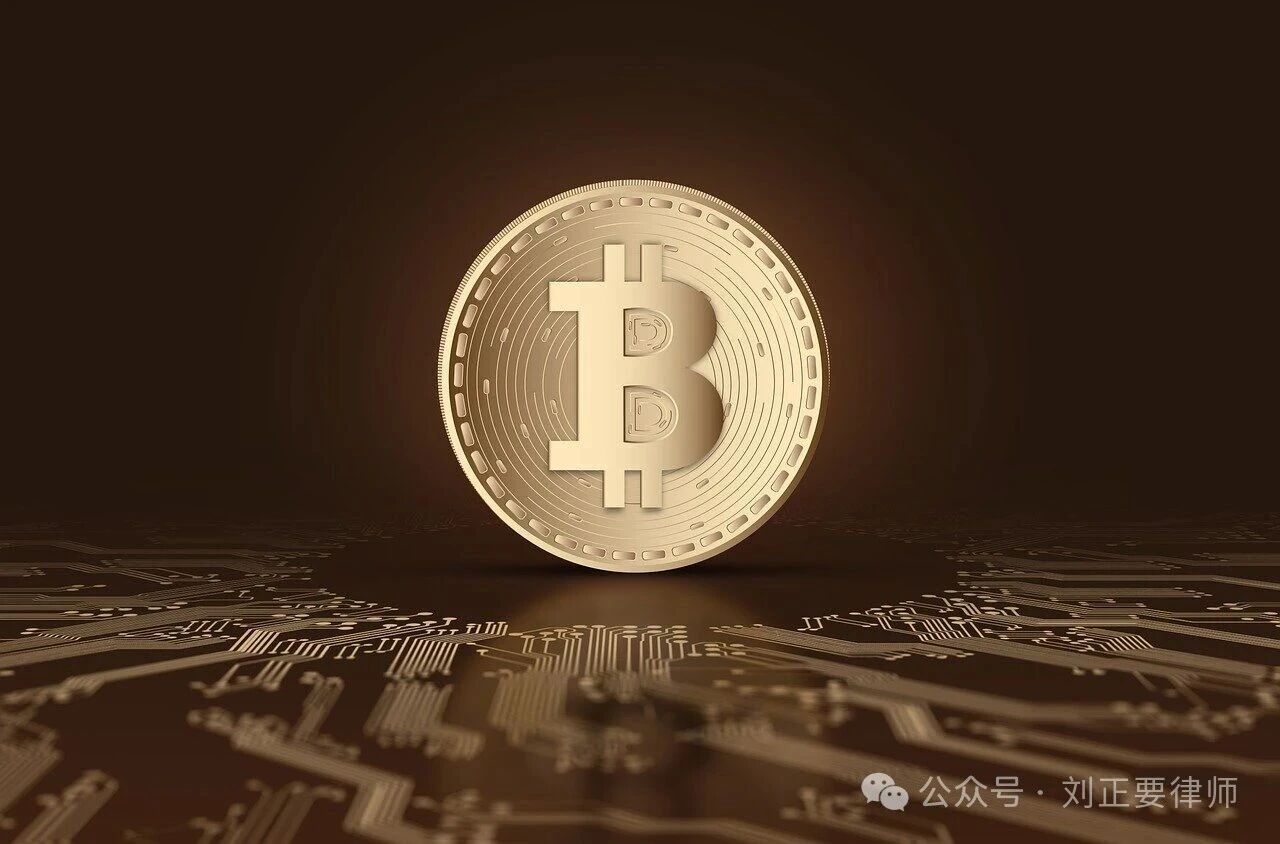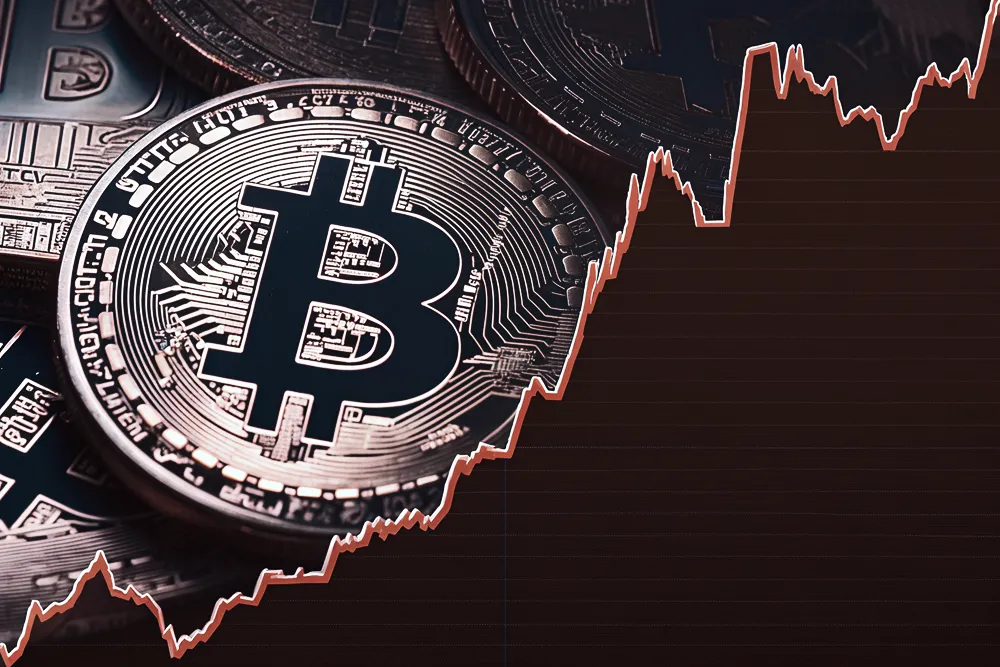Author: Lawyer Liu Zhengyao
Introduction
Yesterday (November 13, 2025), the Supreme People's Court (hereinafter referred to as "the Supreme Court") held the eighth national criminal trial work conference in Beijing. According to media reports, "disposal of virtual currencies involved in cases" was explicitly listed as one of the key topics at this meeting.
As a Web3 lawyer deeply researching the judicial disposal of virtual currencies, the author will discuss this new development today and its potential impact on future domestic judicial disposal operations.

(Image source: Supreme People's Court)
I. Background: Increase in Criminal Cases Involving Virtual Currencies
In recent years, with the rapid development of blockchain technology and virtual currencies globally, China has also faced an increasing number of cases involving "virtual currency + financial crime" and "virtual currency + cybercrime" in the fields of financial crime and cybercrime governance. While judicial authorities have cracked down on crimes such as illegal fundraising, money laundering, online gambling, pyramid schemes, and illegal operations, a large amount of virtual currency involved in cases has been seized and held in the wallets of judicial authorities (mainly public security judicial authorities).
However, at the national level, China has not yet introduced rules for the disposal and monetization of virtual currencies involved in cases. Currently, it is mostly a "trial and error" approach by various provinces, with some provincial public security departments having issued corresponding rules for the investigation and disposal of criminal cases involving virtual currencies.
The Supreme Court and the Supreme People's Procuratorate actually started research on the judicial disposal of virtual currencies involved in cases a long time ago, but a nationwide unified disposal rule has not yet been established. Therefore, the reiteration of "judicial disposal" at this national meeting by the Supreme Court suggests that the formulation of a nationwide disposal model may not be far off.
II. Meeting Content: Supreme Court Emphasizes Disposal of Virtual Currencies Involved in Cases
At yesterday's meeting, the President of the Supreme Court stated that national courts must legally punish the frequent occurrence of new types of crimes and maintain cybersecurity in the current and future periods. In particular, "focus on the disposal of virtual currencies involved in cases, online live-streaming obscene performances, jurisdiction over cybercrime cases, electronic data collection and certification, and other new issues." Additionally, regarding the aforementioned new issues, the Supreme Court aims to "further improve judicial rules and standardize adjudication criteria."
From this, we can infer that, in the view of the Supreme Court:
(1) Judicial disposal of virtual currencies has become a "new situation, new problem";
(2) Judicial authorities need to enhance their disposal capabilities and improve rules. It is highly likely that a nationwide unified disposal model, or even a disposal platform, will be formed in the future;
(3) Judicial disposal is not just an extension of case trials; it also includes the fixation of involved assets, overseas evidence collection, determination of relevant platform responsibilities, cross-border cooperation, and other aspects.
III. Why is "Disposal of Virtual Currencies Involved in Cases" Mentioned? Analyzing from Two Dimensions
(1) Driven by Technological and Economic Backgrounds
The technological and economic characteristics of virtual currencies have triggered a "chain reaction" in judicial practice, mainly reflected in:
First, the integration of virtual currencies, blockchain, big data, and network technology has made it easier for cybercrime and cross-border crime to "take advantage" of virtual currencies, significantly limiting traditional investigative methods. For example, in telecom fraud cases, suspects transfer virtual currencies, "mix coins" for money laundering, and cross-chain transfer before cashing out or fleeing abroad.
Second, alongside financial innovation, financial regulation and criminal justice have also "upgraded in sync." Although virtual currencies have technological innovation value, before their technological benefits are fully realized, regulators are more likely to view virtual currencies from the perspective of social regulation, especially criminal risk. This also explains why the "virtual currency" phenomenon is not well-received in China; the central bank governor recently stated that the central bank will continue to crack down on the operation and speculation of virtual currencies.
Based on the above factors, "crackdown," "regulation," and "control" have become the main themes of China's approach to virtual currencies.

(2) Urgent Need for Judicial Governance
In judicial practice, public security, prosecution, and judicial authorities, as well as other regulatory departments, may find that for "virtual currency crime" cases, China's judicial authorities or other law enforcement agencies still face institutional gaps or ambiguities regarding sentencing, asset return, disposal mechanisms, cross-chain asset tracking, and electronic data collection for cases involving virtual currencies.
Specifically in the field of judicial disposal of virtual currencies, especially pre-case disposal, it not only involves issues of conviction and sentencing but also concerns the complex processes of asset monetization, freezing, transfer, return, and compensation. Judicial authorities must have clear and operable mechanisms. The emphasis on "focusing on the disposal of virtual currencies involved in cases" through a high-level meeting indicates that the Supreme Court, as the highest judicial authority, needs to start playing a role in "top-level design," "trial guidance," and "rule formulation" to fill institutional gaps.
Therefore, the mention of virtual currency disposal at the meeting reflects the dual accumulation of technological evolution and governance needs.
IV. Author's Thoughts and Suggestions
Based on the above analysis, Lawyer Liu proposes the following suggestions for judicial disposal commissioning agencies, third-party disposal companies, virtual currency exchanges, technology support companies, and other relevant parties for reference:
First, all parties need to conduct in-depth research on the "disposal mechanism for virtual currencies involved in cases," especially focusing on the following topics:
The processes for freezing, confiscating, and returning virtual currencies involved in cases; how to determine and dispose of on-chain assets in judicial trials?
In specific cases, how to identify "illegal possession" and "illegally obtained" virtual currencies?
How to conduct on-chain tracking, cross-chain transfers, and cross-border evidence collection? How is the evidentiary value of blockchain assets reflected?
The design of related responsibilities, transfer responsibilities, and prohibitions on platform operations for involved platforms, wallet service providers, and exchanges.
Second, everyone can pay attention to the "compliance design + judicial defense line" consulting services our team provides in the field of judicial disposal of virtual currencies. We can offer legal consulting services from the design phase of judicial disposal projects to the completion of execution. Additionally, we provide legal analysis and preventive suggestions for potential exit mechanisms, integrity system designs, and investor protections that may arise in judicial disposal projects.
Finally, all parties can actively participate in the construction of judicial disposal systems and policy suggestions. For technology companies and disposal companies, based on good cooperative relationships with investigative agencies, they can propose policy suggestions to judicial authorities regarding mechanisms for seizing and freezing virtual assets, standards for collecting on-chain evidence, and cross-border judicial cooperation mechanisms, combining the experiences of Web3 lawyers in judicial practice, which can also enhance the company's influence in the industry.

V. Conclusion
The Supreme Court's proposal to "focus on the disposal of virtual currencies involved in cases" is not only a response from judicial authorities to the new forms of cyber economic crime but also conveys a signal of institutional upgrading, rule clarification, and governance strengthening. For all parties deeply engaged in judicial disposal operations, especially commercial companies in the market, this presents both challenges and opportunities. My view is that clear rules are conducive to market transparency and full competition, which will reduce the real legal risks caused by unclear policies.
免责声明:本文章仅代表作者个人观点,不代表本平台的立场和观点。本文章仅供信息分享,不构成对任何人的任何投资建议。用户与作者之间的任何争议,与本平台无关。如网页中刊载的文章或图片涉及侵权,请提供相关的权利证明和身份证明发送邮件到support@aicoin.com,本平台相关工作人员将会进行核查。




